Short Communication | DOI: https://doi.org/10.31579/2835-9232/034
Bend the Mind to the Body, not the Body to the Mind!
- Seun Ayoade *
Technician Diploma. Advanced Technician Diploma Double Credit Certificates in Electrical Engineering, City and Guilds, London.
*Corresponding Author: Seun Ayoade
Citation: Seun Ayoade, (2023), Bend the Mind to the Body, not the Body to the Mind! International Journal of Clinical Epidemiology, 2(4); DOI:10.31579/2835-9232/034
Copyright: © 2023, Seun Ayoade. This is an open-access article distributed under the terms of the Creative Commons Attribution License, which permits unrestricted use, distribution, and reproduction in any medium, provided the original author and source are credited.
Received: 12 August 2023 | Accepted: 18 August 2023 | Published: 30 August 2023
Keywords: neurotransmitters; dysphoria; psychology
Abstract
Gender Identity Crisis is when an anatomical male feels like a female trapped in a man’s body or an anatomical female feels like a male trapped in a female’s body. The condition is also called gender dysphoria
Summary
- Gender Identity Crisis is when an anatomical male feels like a female trapped in a man’s body or an anatomical female feels like a male trapped in a female’s body. The condition is also called gender dysphoria. I am convinced that the problem is in the patient’s head. Psychiatric wards around the world are filled with people claiming to be what they are not. An example is the man incarcerated in Great Britain who claims to be the Prince of England [1]. Similarly, the former Casius Clay once encountered an elderly man claiming to be the world heavyweight boxing champion [2]
- There are well documented examples of anatomical males who felt like females earlier in life but later stopped feeling that way. Also, there are real documented cases of anatomical females who felt like males early in life but later started feeling like females. Yet, in all of recorded history there is not ONE verified case of a person who was born anatomically male and then spontaneously or slowly switched to anatomical female or vice versa just like that or over time.
- Hence, it makes more sense to treat the psychology and not the anatomy. Especially since sex change operations cost a lot of money, produce less than perfect results and carry risks and complications [3-6]
- Therefore, I propose that the mind should be bent to fit the body and not the body bent to fit the mind. If an anatomical male feels like a female let the anatomical male be give MALE hormones and MALE level neurotransmitters to let his psychology match his anatomy. And if an anatomical female feels like a psychological male let her be given FEMALE hormones and FEMALE level neurotransmitters to cure her condition. [7-8]
- Urologists, plastic surgeons and psychologists worldwide are getting the cure mixed up! Treat the psychology NOT the anatomy. Realign the psychology to match the anatomy-not the anatomy to match the psychology!
- There is ONE feat I humbly request any and every surgeon worldwide to perform to convince me that surgery is the better solution to gender identity crisis/dysphoria. I challenge any surgeon to safely reduce a man’s brain size by 10% and safely increase a woman’s brain size by 10% [9]
References
- Prince Harry, Duke of Sussex, Spare, (2023). Pennguin Random House
View at Publisher | View at Google Scholar - Richard Durham, (1975). The Greatest: My Own Story
View at Publisher | View at Google Scholar - AMERICAN SOCIETY OF PLASTIC SURGEONS What are the risks of transfeminine bottom surgery?
View at Publisher | View at Google Scholar - gender-affirmation-confirmation-or-sex-reassignment-surgery
View at Publisher | View at Google Scholar - Richard P. Fitzgibbons Transsexual attractions and sexual reassignment surgery: Risks and potential risks PMID: 26997675
View at Publisher | View at Google Scholar - https://pubmed.ncbi.nlm.nih.gov/30269882/
View at Publisher | View at Google Scholar - https://pubmed.ncbi.nlm.nih.gov/25424337/
View at Publisher | View at Google Scholar - https://www.ncbi.nlm.nih.gov/pmc/articles/PMC8493822/
View at Publisher | View at Google Scholar - Ian Michael Grant, MD Battle of the Brain: Men Vs. Women [Infographic]
View at Publisher | View at Google Scholar - dysphoria/what-is-gender-dysphoria
View at Publisher | View at Google Scholar

 Clinic
Clinic
